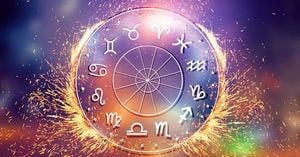As Mother's Day approaches, countless celebrities are taking to social media to share heartfelt moments with their mothers and children, expressing gratitude, love, and nostalgia. The occasion becomes a reminder of both joy and loss, with many expressing appreciation for the presence of their mothers while others reflect on the profound emptiness left by those who have passed.
Lebanese actress Nadine Njeim celebrated with her children, posting a series of pictures filled with warmth and flowers. She captioned her Instagram photos, saying, "God keep my kids safe from harm, a proud mother," encapsulating the joys of motherhood.
Similarly, Carla Haddad shared cherished moments with her daughter, Lea Abou Jaoudeh, dressing them in matching pink outfits and writing, "My heart walks outside my body. Happy Mother's Day! 💗" Such sentiments reflect the deep emotional connections that bind parents and children.
Emerging from the theme of remembrance, singer Ragheb Alama took a moment to remember his late mother with poignant words shared in a video on X, formerly Twitter. He expressed, "What can I say to talk about my mother? Ragheb the strong and the sensitive, these are all her doing. She raised me to be this way, encouraged me to sing—when she would call the neighbors to hear my beautiful voice." He added, "My mother was my first motivator and my greatest supporter. She never leaves my side, even after her departure; she is with me every day."
In a similar spirit, actress Cyrine Abdelnour posted a photo with her deceased mother, expressing her longing with the words, "I miss you, Mom," encapsulating the bittersweet nature of the day for many.
Sham Al-Dhahabi, also celebrating the day, shared joyous moments with her children and commented, "Ali, Adam, and Jihan… I am grateful for the motherhood you have given me. The emotions, the challenges, the responsibility… every part of it is a joy, except when you make me pull my hair out! 😂😌" Her lightheartedness highlights the trials and triumphs of parenting.
Lebanese actress Lubna Abdel-Aziz discussed her mother's profound impact during an interview with Mona Moussali on her podcast, saying, "My mother is one of the people who greatly influenced my life. My mother is Egyptian, and I am very proud of that part of me. She came with her beautiful culture, and even though she wasn't educated, she was a very strong personality." She added with emotion, "Many people ask me, 'Where does your strength come from?' and I tell them it's from her. My mother faced countless difficulties, especially after my father died when she was young. She raised us the best way she could. May God grant us to intercede for her on the Day of Judgment, and I hope that I will not be without her in this world, and that I will meet her, and she will be pleased with me."
The emotional weight of Mother's Day is felt strongly across communities, particularly in regions suffering from ongoing conflict. As wars rage in Syria, Yemen, Libya, and beyond, the article reflects on the resilience of mothers who bear the burden of hope amid chaos. The anguish and aspiration intertwined in their stories serve as a poignant reminder of their unconditional love and sacrifices.
The origin of Mother's Day dates back to the United States in 1908 when the concept began to spread globally. In the Arab world, the idea was popularized by Egyptian journalist Ali Amin, who, recognizing the need for a day to honor mothers, proposed it in his column. His vision resonated with readers, leading to a broader acceptance and celebration, culminating in the designation of March 21 as Mother's Day—aligned with the spring equinox, symbolizing renewal and joy.
Dr. Ahmed Naboui, a member of the Supreme Council for Islamic Affairs, emphasized the importance of respecting mothers, stating during a program, "The mother represents a wide door to God's mercy, and honoring her counts as one of the greatest deeds to fill the scales of good deeds." He further referenced Islamic teachings regarding the importance of mothers, underlining their esteemed status in the community.
As the day brings a mix of joy and reflection, it serves as a moment to recognize the sacrifices made by mothers everywhere. The expression of love, the giving of gifts, and the gathering of families are all part of the traditions that allow children to honor their mothers, showing respect and appreciation.
In stark contrast, on this day of celebration, some choose to reflect privately, as showcased by the author's personal history. She recounts the loss of her mother at a young age. The connection to Mother's Day for her becomes fraught with pain. The memories of her mother's struggles and sacrifices only deepen the sense of longing on a day meant for joy. She recalls, "I hated Mother's Day because of the sorrow associated with it; my mother's tears were always present every time I thought of my grandmother's passing. The grief became unbearable as it was forced upon me, and I remember the moments when I wanted to ask her so many questions and store our family recipes. Now that she is gone, every memory feels heavy with loss."
In the end, Mother's Day remains a complex emotional landscape, defined by joy and heartbreak, where every shared moment, every tear shed, brings forth a deeper understanding of love, sacrifice, and the fleeting nature of life.









